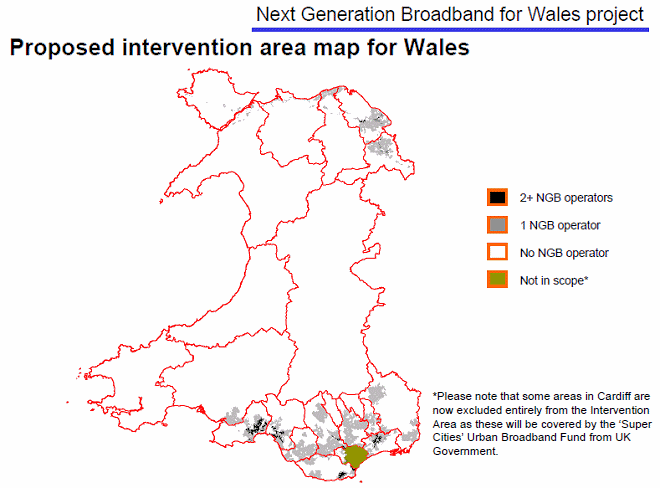No Surprise as Wales UK Award GBP425m Superfast Broadband Contract to BT
The Welsh Government (WG) has today surprised nobody by awarding its £425m contract for the Next Generation Broadband Wales tender to BT. But of course it would as the telecoms giant has been the only bidder since January 2012 (here) when rival Fujitsu UK “voluntarily” withdrew due to the “risk levels“.
The Digital Wales Strategy envisages a roll-out of 30Mbps+ capable superfast broadband ISP services to reach 100% of the country’s businesses by the middle of 2016 and homes by 2020. But today’s news aims for 96% of Welsh homes and businesses to have access to “world class broadband speeds” of up to 80Mbps (FTTC) by the end of 2015. Some areas will also get BT’s 330Mbps FTTP service, which will become optional on almost all FTTC lines from next Spring 2013 through an expensive FTTP-On-Demand solution.
Advertisement
The scale of the problem becomes much clearer when you take a look at the following map, which was released by the WG in January 2012 and shows that the vast major of Wales (a largely rural country) has no access to Next Generation Broadband (NGB). According to Ofcom, just 34% of homes in Wales can access a superfast broadband service (23% via Virgin Media’s cable and 17% via BT’s FTTC).

The funding for this project will come from several areas. The Broadband Delivery UK (BDUK) office has already allocated £56.9 Million, while the Welsh Government has put in £58 million and a further £90 million will also come from the European Regional Development Fund (ERDF). In addition BT claims to be investing approximately £220 million in Welsh “fibre broadband” with most of that going towards this specific project.
Carwyn Jones, First Minister for Wales, said:
“This is an incredibly important agreement for Wales. Our partnership with BT will see to it that Wales does more than simply catch up with our neighbours; we intend to catch-up, overtake and then set the pace that others will strive to match. The project will transform the broadband landscape across Wales and ensure that local businesses can become global businesses. It will ensure that firms remain in Wales and it will also attract a more diverse range of high growth, high value companies to the country across all our key sectors from tourism to high end manufacturing.
As a result of Welsh Government, UK Government, European Structural Funds (ERDF) and private sector investment, a solution has been secured that will leverage the funding available to achieve best value for the Welsh pound. We have leveraged over £6 for every £1 invested by the Welsh Government.”
Liv Garfield, CEO of BTOpenreach, added:
“This project will position Wales as a broadband leader and we are delighted to have signed this contract with the Welsh Government to make it happen. Wales will become one of the best connected countries in the world and will be ahead of the chasing pack. The Welsh Government has shown great vision and we are certain that will pay off in terms of economic growth. The apprenticeships and work experience that we’re offering will mean the roll-out of this next generation network will inspire the next generation of workers.”
Furthermore BT will create 50 new jobs and 100 new apprenticeships, while 320 existing jobs will also be protected as a result of the project. In addition, the telecoms giant will offer 900 young people a week’s work experience, although it’s not clear what that will involve.
But some critics fear that having only one major bidder has put the Welsh Government in a difficult position, giving it less bargaining power to negotiate favourable conditions and raising additional competition concerns within the European Commission (full details).
Advertisement
Richard Brown, COO of Wispa Limited, said:
“It is an entirely cynical plan to attempt to ‘big up’ what the Welsh Government are doing, but it is totally clear that the contract will not deliver the levels of improvement necessary within Wales, and in fact it seems that even BT admit that they will not be able to deliver to all of Wales themselves.
Sadly, it is typical of this Government that they will claim a huge win for Wales, but the devil will be in the detail. We had an opportunity to shape the economic and digital future of Wales, but we are about to squander it on the largest white elephant in town: More speed improvements in areas that would have received funding anyway, but where it is desperately required, will continue to receive little or no interest. I’m simply disgusted.”
Like so many similar projects this initiative is now subject to State Aid approval from the European Commission (EC), which is still trying to work through a number of serious concerns with the UK’s overall strategy. As a result no completion date for the project can be set until this is resolved.
Despite the problems we’re sure that many ordinary people will just be happy if the 100% target could actually be achieved.
UPDATE 4:22pm
A comment from the Country Land and Business Association (CLA) has just arrived.
Advertisement
CLA Vice-President, Ross Murray, said:
“It is such a vital service for the rural economy but the lack of broadband in rural Wales puts businesses at a competitive disadvantage. Since the Welsh Government first announced its plan to roll out superfast broadband last year, we have waited and waited for further information so a 2015 confirmation is very welcome.”
The priority now is for the Government and BT to address the areas in Wales that currently receive no broadband or very slow speeds. The Government must ensure that BT does not simply increase the speeds of the 10 to 15 percent who already have superfast broadband, but concentrates on those households and businesses that have suffered from poor broadband for the past 10 years.”
Mark is a professional technology writer, IT consultant and computer engineer from Dorset (England), he also founded ISPreview in 1999 and enjoys analysing the latest telecoms and broadband developments. Find me on X (Twitter), Mastodon, Facebook, BlueSky, Threads.net and Linkedin.
« OECD Ranks UK 8th in its Fixed Broadband Rankings of 34 Countries

















































Comments are closed